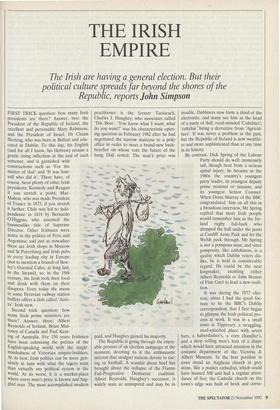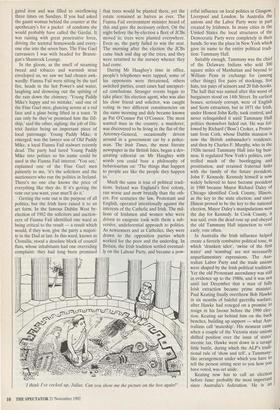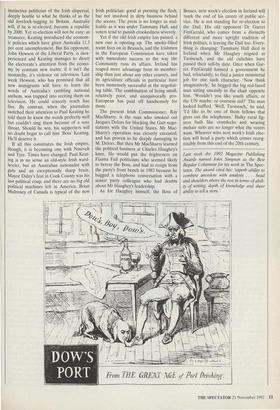THE IRISH EMPIRE
The Irish are having a general election. But their political culture spreads far beyond the shores of the
Republic, reports John Simpson FIRST TRICK question: how many Irish presidents are there? Answer, two: the President of the Republic of Ireland, the excellent and personable Mary Robinson, and the President of Israel, Dr Chaim Hertzog, who was born in Belfast and edu- cated in Dublin. To this day, his English (and for all I know, his Hebrew) retains a gentle rising inflection at the end of each sentence, and is garnished with constructions such as 'For the matter of that' and 'It was him- self who did it'. There have, of course, been plenty of other Irish presidents: Kennedy and Reagan if you stretch a point, Mac- Mahon, who was made President of France in 1873, if you stretch it farther. Chile was led to inde- pendence in 1818 by Bernardo O'Higgins, who assumed the businesslike title of Supreme Director. Other Irishmen were active in the politics of Peru and Argentina; and just as nowadays there are Irish shops in Moscow and St Petersburg and Irish pubs in every leading city in Europe (not to mention a branch of Bew- ley's Oriental Cafes, at long last, in the Strand), so, in the 19th century, the Irish took their food and drink with them on their diaspora. Even today the menu In some Peruvian railway station buffets offers a dish called `Airis- tu': Irish stew.
Second trick question: how many Irish prime ministers are there? Answer, three: Albert Reynolds of Ireland, Brian Mul- roney of Canada and Paul Keat- ing of Australia. For 150 years Irishmen have been colonising the politics of the English-speaking world with the single- mindedness of Victorian empire-builders. At its best, Irish politics can be more gen- uinely in tune with what the voters want than virtually any political system in the world. At its worst, it is a market-place where every man's price is known and hag- gled over. The most accomplished modern practitioner is the former Taoiseach, Charles J. Haughey, who associates called `The Boss'. 'You know what I want; what do you want?' was his characteristic open- ing question in February 1982 after he had negotiated the narrow staircase to a poky office in order to meet a brand-new back- bencher on whose vote the future of the hung Dail rested. The man's price was paid, and Haughey gained his majority.
The Republic is going through the enjoy- able process of an election campaign at the moment, devoting to it the enthusiastic interest that stodgier nations devote to rac- ing or football. A scandal about beef has brought about the collapse of the Fianna Fail-Progressive Democrat coalition. Albert Reynolds, Haughey's successor, is widely seen as uninspired and may be in trouble. Dubliners now form a third of the electorate, and many see him as the head of a party of dull, rural-minded 'Cultchies'; `cultchie' being a derivative from 'Agricul- ture'. It was never a problem in the past, but the Republic of Ireland is now wealthi- er and more sophisticated than at any time in its history.
By contrast, Dick Spring of the Labour Party should do well: immensely tall, though bent from a serious spinal injury, he became in the 1980s the country's youngest party leader, its youngest deputy prime minister or tanaiste, and its youngest Senior Counsel. When Denis Murray of the BBC congratulated him on all this in a broadcast interview, Mr Spring replied that most Irish people would remember him as the Ire- land rugby full-back who dropped the ball under the posts at Cardiff Arms Park and let the Welsh pack through. Mr Spring is not a pompous man; and since pomposity, like cultchiness, is a quality which Dublin voters dis- like, he is held in considerable regard. He could be the next kingmaker, enabling either Albert Reynolds or John Bruton of Fine Gael to lead a new coali- tion.
It was during the 1973 elec- tion, when I had the good for- tune to be the BBC's Dublin correspondent, that I first began to glimpse the Irish political pro- cess at work. It was in a small town in Tipperary: a straggling, mud-splashed place with seven bars, a haberdasher's, a corn chandler's, and a shop selling men's hats of a shape which would have attracted attention in the costume department of the Victoria & Albert Museum. In the best position in town stood an Anglican church in grey stone, like a pocket cathedral, which could have housed 500 and had a regular atten- dance of five; the Catholic church on the town's edge was built of brick and corru- gated iron and was filled to overflowing three times on Sundays. If you had asked the gaunt woman behind the counter at the apothecary's for a packet of condoms she would probably have called the Gardai. It was raining with great penetrative force, driving the teetotal homewards and every- one else into the seven bars. The Fine Gael canvassers I was with headed for Branni- gan's Shamrock Lounge.
In the gloom, as the smell of steaming tweed and tobacco and warmish stout enveloped us, we saw we had chosen awk- wardly: Fianna Fail were sitting by the turf fire, heads in the hot Power's and water, laughing and drowning out the spitting of the rain down the chimney. 'Young Paddy Mike's happy and no mistake,' said one of the Fine Gael men, glancing across at a red face and a glass being lifted in a toast. 'It can only be they've promised him the DJ- ship,' said the other, sighing; the job of Dis- trict Justice being an important piece of local patronage. Young Paddy Mike, it emerged, was the lawyer son of Old Paddy Mike, a local Fianna Fail stalwart recently dead. The party had lured Young Paddy Mike into politics so his name could be used in the Fianna Fail interest. 'You see,' explained one of the Fine Gael men patiently to me, 'it's the solicitors and the auctioneers who run the politics in Ireland. There's no one else knows the price of everything like they do. If it's getting the vote out you want, your man'll do it.'
Getting the vote out is the purpose of all politics, but the Irish have raised it to an art form. In the famous Dublin West by- election of 1982 the solicitors and auction- eers of Fianna Fail identified one ward as being critical to the result — a result which would, if they won, give the party a majori- ty in the Dail at last. In this ward, known as Clonsilla, stood a desolate block of council flats, whose inhabitants had one overriding complaint they had long been promised that trees would be planted there, yet the estate remained as barren as ever. The Fianna Fail environment minister heard of this and gave the necessary orders. On the night before the by-election a fleet of JCBs moved in; trees were planted everywhere. Even so, the party failed to win the seat. The morning after the election the JCBs came back and dug up the trees, and they were returned to the nursery whence they had come.
During Mr Haughey's time in office, people's telephones were tapped, some of his opponents were threatened, others switched parties, court cases had unexpect- ed conclusions. Stranger events began to take place: his election agent, who was also his close friend and solicitor, was caught voting in two different constituencies on the same morning and duly became known as Pat O'Connor Pat O'Connor. The most wanted man in the country, a murderer, was discovered to be living in the flat of the Attorney-General, occasionally driven around in a government car by a police- man. The Irish Times, the most literate newspaper in the British Isles, began a dev- astating editorial on Mr Haughey with words you could base a philosophy of behaviourism on: 'The things that happen to people are like the people they happen to.'
Much the same is true of political tradi- tions. Ireland was England's first colony, run worse and more brutally than the oth- ers. For centuries the law, Protestant and English, operated intentionally against the interests of the Catholic and Irish. The mil- lions of Irishmen and women who were driven to emigrate took with them a sub- versive, undeferential approach to politics. As newcomers and as Catholics, they were drawn to the opposition parties which worked for the poor and the underdog. In Britain, the Irish tradition settled eventual- ly on the Labour Party, and became a pow- think I've cocked up, Julius. Can you show me the picture on the box again?' erful influence on local politics in Glasgow, Liverpool and London. In Australia the unions and the Labor Party were in part created by Irishmen. In many cities in the United States the local structures of the Democratic Party were completely in their hands. So was the place in New York which gave its name to the entire political tradi- tion: Tammany Hall. Suitably enough, Tammany was the chief of the Delaware Indians who sold 300 square miles of Manhattan and beyond to William Penn in exchange for (among other things) five pairs of stockings, five hats, ten pairs of scissors and 20 fish-hooks. The hall that was named after this worst of bargainers stood on 14th Street. Its earliest bosses, seriously corrupt, were of English and Scots extraction, but in 1871 the Irish, under Honest John Kelly, took control, and never relinquished it until Tammany Hall politics themselves faded out. He was fol- lowed by Richard (`Boss') Croker, a Protes- tant from Cork, whose Dublin mansion is now the British ambassador's residence, and then by Charles F. Murphy, who in the 1920s turned Tammany Hall into big busi- ness. It regulated New York's politics, con- trolled much of the bootlegging and prostitution, and retained fraternal links with the family of the future president, John F. Kennedy. Kennedy himself is now widely believed to have become president in 1980 because Mayor Richard Daley of Chicago identified Cook County, Illinois, as the key to the state election; and since Illinois proved to be the key to the national election, Mayor Daley's manipulations won the day for Kennedy. In Cook County, it was said, even the dead rose up and obeyed the old Tammany Hall injunction to vote early, vote often.
In Australia the Irish influence helped create a fiercely combative political tone, in which 'drunken idiot', 'swine of the first water' and `scumbag' are not necessarily unparliamentary expressions. The Aus- tralian Labor Party and the trade unions were shaped by the Irish political tradition. Yet the old Protestant ascendancy was still in evidence up to the 1980s, and it was not until last December that a man of fully Irish extraction became prime minister. Paul Keating finally overthrew Bob Hawke in six months of baleful guerrilla warfare, after Hawke had reneged on a promise to resign in his favour before the 1990 elec- tion. Keating sat behind him on the back benches, building up support — what Aus- tralians call `mateship'. His moment came when a couple of the Victoria state unions shifted position over the issue of states, income tax. Hawke went down in a savage little battle, during which the ALP's tradi- tional rule of 'show and tell', a Tammany- like arrangement under which you have to tell the person sitting next to you how you have voted, was set aside.
Keating now has to call an election before June: probably the most important since Australia's federation. He is an
instinctive politician of the Irish dispersal, deeply hostile to what he thinks of as the old forelock-tugging to Britain. Australia will, if he is re-elected, become a republic by 2000. Yet re-election will not be easy: as treasurer, Keating introduced the econom- ic policies which have given Australia 11.3 per cent unemployment. But his opponent, John Hewson of the Liberal Party, is inex- perienced and Keating manages to divert the electorate's attention from the econo- my by constant new stunts: if it isn't the monarchy, it's violence on television. Last week Hewson, who has promised that all new immigrants will have to learn the words of Australia's rambling national anthem, was trapped into reciting them on television. He could scarcely reach line five. By contrast, when the journalists switched their attention to Paul Keating he told them he knew the words perfectly well but couldn't sing them because of a sore throat. Should he win, his supporters will no doubt begin to call him 'Boss' Keating. He'll deserve it.
If all this constitutes the Irish empire, though, it is becoming one with Nineveh and Tyre. Times have changed: Paul Keat- ing is in no sense an old-style Irish ward- heeler, but an Australian nationalist with guts and an exceptionally sharp brain. Mayor Daley's feat in Cook County was his last political coup, and there are no big old political machines left in America. Brian Mulroney of Canada is typical of the new Irish politician: good at pressing the flesh, but not involved in dirty business behind the scenes. The press is no longer as mal- leable as it was under Tammany Hall, and voters tend to punish crookedness severely.
Yet if the old Irish empire has passed, a new one is opening up. The smoke-filled room lives on in Brussels, and the Irishmen in the European Commission have taken with immediate success to the way the Community runs its affairs. Ireland has reaped more advantage from its member- ship than just about any other country, and its agriculture officials in particular have been immensely successful at the negotiat- ing table. The combination of being small, relatively poor, and unequivocally pro- European has paid off handsomely for them.
The present Irish Commissioner, Ray MacSharry, is the man who smoked out Jacques Delors for blocking the Gatt nego- tiations with the United States. Mr Mac- Sharry's operation was cleverly executed, and has proven to be deeply damaging to M. Delors. But then Mr MacSharry learned the political business at Charles Haughey's knee. He would put the frighteners on Fianna Fail politicians who seemed likely to betray the Boss, and had to resign from the party's front bench in 1983 because he bugged a telephone conversation with a senior party colleague who had doubts about Mr Haughey's leadership.
As for Haughey himself, the Boss of Bosses, next week's election in Ireland will mark the end of his career of public ser- vice. He is not standing for re-election to the Dail. His old opponent Dr Garret FitzGerald, who comes from a distinctly different and more upright tradition of Irish politics, is leaving the Dail too. Every- thing is changing: Tammany Hall died in Ireland when Mr Haughey reigned as Taoiseach, and the old cultchies have passed their sell-by date. Once when Gar- ret FitzGerald formed a government he had, reluctantly, to find a junior ministerial job for one such character. 'Now think imaginatively,' he begged the big red-faced man sitting uneasily in the chair opposite him. 'Wouldn't you like youth affairs, or the UN maybe, or overseas aid?' The man looked baffled. 'Well, Taoiseach,' he said, `I'd like to be one of them fellows that gives out the telephones.' Bulky rural fig- ures built like cromlechs and wearing mohair suits are no longer what the voters want. Whoever wins next week's Irish elec- tion will head a party which comes recog- nisably from this end of the 20th century.
Last week the 1992 Magazine Publishing Awards named John Simpson as the Best Regular Columnist for his work in The Spec- tator. The award cited his: 'superb ability to combine ancedote with analysis . . . head and shoulders above the rest in terms of abili- ty of writing, depth of knowledge and sheer ability to tell a story.'
From THE GREAT AGE .? Port Drinking.












































































 Previous page
Previous page